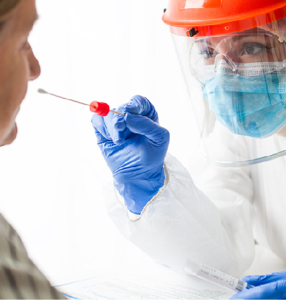Understand the approach employers can take to workplace testing.
The information in this article is no longer up-to-date. For the latest information on testing please see the article on 1 April changes to Covid guidance.
Testing, tracing, and isolating remains a core part of the UK’s toolkit in the fight against COVID-19.
This factsheet contains information for employers who might want to provide asymptomatic testing for employees or others on-site (such as suppliers and agency staff). With up to a third of COVID-19 sufferers estimated to show no symptoms, widespread asymptomatic testing is one tool in response to the pandemic to enable safe business operations. Government-funded asymptomatic workplace testing is no longer available, but firms can invest in private testing or encourage employees to get tests through community routes.
UPDATE:
As of January, anyone with symptoms who tests positive on a Lateral flow device (LFD) antigen test is no longer required to take a confirmatory PCR test. They should immediately self-isolate and register the result on GOV.UK.
Individuals are now advised to test when they are more like to catch or spread COVID-19, such as before mixing in a crowded indoor place or visiting someone who is at higher risk of getting seriously ill from COVID-19.
The CBI has also created a complementary factsheet on NHS Test and Trace (including links to guidance for Scotland, Wales, and Northern Ireland).
What’s the latest information and insight?
Tests can identify whether someone currently has or previously had the disease, helping to pinpoint isolated cases and outbreaks – but the testing landscape can be complex to navigate.
Businesses have an important role to play in breaking chains of transmission by testing their workforce on a regular basis. The government has recognised this, providing practical guidance for employers who want to offer workplace testing for asymptomatic employees; including advice on the testing process, the collection of results, communicating results to staff, and what an employer can and can’t do with a result.
The CBI continues to work with the government to build understanding and support around the processes and practicalities of workplace testing.
Routes to government-funded free testing
Government-funded workplace testing
Access to free workplace testing has now ended.
Organisations that signed up to the government’s asymptomatic testing scheme and have existing can continue to use this in line with standard operating procedure until their stocks are depleted.
Community testing
Businesses can direct their employees to access LFD tests either from their local pharmacy or by ordering them to their home. The government continues to encourage regular testing, and will continue to be guided by public health advice in their approach to providing free asymptomatic testing.
Private workplace testing
Finding a testing provider
Many businesses are engaging with third-party providers to purchase tests or organise and run testing. To guide employers, the government has published a list of private testing providers, which is constantly reviewed. This identifies the providers who have declared that they meet the minimum legal and regulatory standards for private sector providers of COVID-19 testing – including aligning testing use with the scope set out by the Medicines and Healthcare Regulatory Agency (MHRA), reporting results to Public Health England (PHE), and having the relevant systems in place to report adverse incidents.
Before engaging in testing, businesses will also need to think carefully about their operations and staff, taking learnings from their response to the pandemic to determine what will work best for their organisation. Some questions to consider include:
- What type of workplace settings will testing be most useful for?
- Which test will best suit my organisation’s need?
- What will testing enable my organisation to do?
- What are my legal obligations as an employer?
- What will the health and safety requirements be?
- How can I incentivise my workforce to take up testing?
- What are the logistical and practical requirements around the delivery of workplace testing? i.e., do I require additional trained staff to manage the programme?
- How regularly does testing need to be undertaken? How long should I implement testing for?
Deciding which tests to use
There are a variety of different COVID-19 tests available, with trade-offs between accuracy, pace, cost, and usability – which may impact which scenarios or workplace settings they are most suitable for. The government advises that businesses discuss with their provider what tests are appropriate for their workplace and the accuracy of tests.
The most common tests to see if someone is currently infected are:
- RT-PCR: regarded as the gold-standard in testing and used by NHS Test and Trace, RT-PCR tests are highly accurate. However, they are more expensive and can have a longer turnaround time for results because they must be analysed in a lab. They are performed using a nasal and throat swab and, inmost cases, require a medical professional to administer
- Lateral flow device (LFD) antigen: using the same technology as pregnancy tests, these swab or saliva tests are quicker than RT-PCR tests. Used in the government’s free testing schemes (including for workplace and home testing), LFD tests have a margin of error for negative results but tend to have more accurate positive results. People who test positive on an LFD test are no longer required to take a confirmatory RT-PCR test
- RT-LAMP: a test using a swab or saliva sample. Quicker and cheaper than RT-PCR, with results that can be read by eye.
Additionally, antibody tests can detect whether someone has had COVID-19 using a finger prick or blood test. An antibody test does not tell someone whether they currently have the virus, if they’re immune, or whether they can spread it to others.
Employers should note that no test will be completely accurate and that every test gives a result for that point in time.
Tracing
Tracing works by identifying a confirmed case and asking the infected individual who they have been in contact with, helping to isolate cases before they become infectious and providing valuable insight into how the infection is being transmitted.
Some firms have also found it useful to set up internal tracing programmes to help monitor and learn from workplace outbreaks or identify possible areas of transmission. Businesses should note that this is not a substitute for NHS Test and Trace, with Test and Trace advice taking precedence over internal advice on isolation.
Financial support, including statutory sick pay
Experience of the pandemic to date shows that some workers are less likely to follow public health guidance to self-isolate if they have financial or job security concerns. Employees in self-isolation are entitled to Statutory Sick Pay (SSP) for every day they are in isolation, provided they meet the eligibility conditions. The government has published guidance on this.
To support them during self-isolation, some employees may also be eligible for a one-off payment of £500 under the Test and Trace Support Payment scheme. This scheme will continue until 31 March , and covers parents and guardians during a child or young person’s self-isolation period.
Employers should be explicit in their communication with workers of the level of support that their business can offer to people unable to work because they are sick or asked to isolate.
SMEs can claim a rebate for SSP for covering up to two weeks of self-isolation per employee. They will need a coronavirus isolation note from their employee to make the claim.
- Employees – generate a coronavirus isolation note
- Employers – check a coronavirus isolation note
People are not eligible for SSP if they are ‘workers’, self-employed, or earn below £120 a week. SSP is paid at just under £96 per week. SSP rates could simultaneously be a financial penalty for employees who cannot work because of isolation, and an unsustainable cost burden for employers, particularly if employees are told to isolate for multiple periods. The cost for firms that offer occupational sick pay could also be much higher.
Impact on workers
Government guidance still requires those who test positive to self-isolate for ten days from the day their symptoms started or they took a positive test (if they don’t have symptoms).Vaccinated individuals who test negative on an LFD on Day 5 and 6 of their self-isolation period may stop self-isolating. Self-isolation in accordance with the NHS guidelines will be especially difficult for some employees and may affect their mental health. Employers should continue to communicate with staff during this period. The CBI has created a factsheet on mental health and wellbeing in a crisis and a Front of Mind Guide.
Data protection
Firms recognise the vital importance of protecting the sensitive data involved in Test and Trace, in order to maintain employee and customer trust in the use of their personal data while reducing the spread of infection. Health data is special category data under the GDPR, so you need a legal reason to process it.
Businesses should refer to guidance from the UK data protection regulator, the Information Commissioner’s Office, which has produced workplace testing advice for organisations as well as general guidance on broader data protection issues related to the pandemic.
Routes to testing in the devolved nations
Devolved Administrations have different approaches to testing. Information on the testing strategies can be found at:
Wales
- Workplace testing: the Welsh government provides further detail about support offered to businesses in the COVID-19 workplace testing framework
- Community testing: other routes for individuals to access rapid lateral flow testing can be found on the GOV.WALES website
- Travel: information on travel can be found on the GOV.WALES website.
Scotland
- Workplace testing: read further information on the Scottish government’s workplace testing scheme including how to register interest. The Scottish government has also released guidance for employers on private employee testing programmes
- Community testing: more information can be found here
- Travel: rules around international travel can be found on the Scottish government website.
Northern Ireland
FAQs
Currently, what will testing enable employers to do?
With infection rates remaining high, workplace testing can help to protect your staff, helping to give confidence to those who continue to come into work, as well as your business operations.
Why should employers continue to offer testing now the universal free testing offer has ended?
The most important thing is that as many people as possible test regularly and report their results, whichever route they use. Workplace testing as a way for employers to ensure regular testing is available to people who might not access it otherwise.
If someone receives a positive LFD test result, what should they do?
The individual who has tested positive must self-isolate for ten days following a positive LFD result. The individual is no longer required to take a confirmatory PCR test, unless they are applying for a Test and Trace Support Payment. The individual will need to self-isolate straight away and report their result.
From January 2022, vaccinated individuals who test negative on an LFD test on Day 5 and 6 of their self-isolation period may stop self-isolating. Vaccinated contacts of an individual who has tested positive are no longer required to self-isolate, but they are advised to take daily LFD tests for seven days.
What type of testing is occurring for travelling to/returning from other countries?
Given the global nature of the health crisis, both inbound and outbound international travel have been severely impacted, with testing requirements being introduced and changed regularly. Employers that require staff to travel regularly across UK borders must take reasonable steps to enable their employees to take tests. The government has issued step-by-step guidance on what international travellers need to do, in addition to updating the entry requirements different countries might have.
Testing for the purposes of international travel, either at departure or upon arrival, is not available on the NHS. To help find a provider, the government has composed a list of private test providers who meet the minimum standards for this purpose.
The CBI continues to engage closely with the government on a roadmap to testing-free travel.
How do tests and testing providers get approved?
The Medicines and Healthcare Regulatory Agency (MHRA) regulates testing kits. Testing kits approved for use must have a valid CE mark to show that the manufacturer has met the minimum safety and performance requirements for the product. Currently, the route to obtaining the data used by each manufacturer of COVID-19 tests to achieve its CE marking is unique and designed by each manufacturer. Adverse experiences with medical devices like testing kits can be reported to the MHRA using the Coronavirus Yellow Card reporting site.
Following consultation on private COVID-19 testing validation, the government will introduce a requirement for the validation of COVID-19 tests. This will ensure tests are of sufficient quality to protect public health and instil confidence in testing.
Any organisation that intends to carry out a commercial COVID-19 testing service must meet the minimum legal standards for their role in the testing process. A list of providers who have declared they meet these standards and are undergoing United Kingdom Accreditation Service (UKAS) accreditation can be found here.
Further resources
CBI resources
- Watch the CBI’s webinar on COVID-19 Plan B, analysing the government's plan B measures and how businesses could look beyond in 2022
- Watch the CBI’s webinar with Caroline Makepeace, Deputy Director for Workplace Testing, DHSC and Simon Rice-Birchall, Partner, Eversheds Sutherland, within insight into the routes employees can access tests and employment law considerations for firms
- Watch the CBI’s webinar with Ben Osborn, MD and UK Country Manager of Pfizer, and Professor Devi Sridhar, Chair of Global Public Health at the University of Edinburgh, which provides insight into COVID-19 vaccination and the continued importance and potential of mass testing.
Government and regulator resources
- NHS guide to testing for COVID-19
- Guidance for private-sector employers and third-party providers who want to offer workplace testing
- Private providers of coronavirus testing: what you need to know
- Guidance on claiming back Statutory Sick Pay paid to employees due to COVID-19
- Latest guidance on self-isolation policy in England
- ICO data protection and COVID-19 advice for organisations











